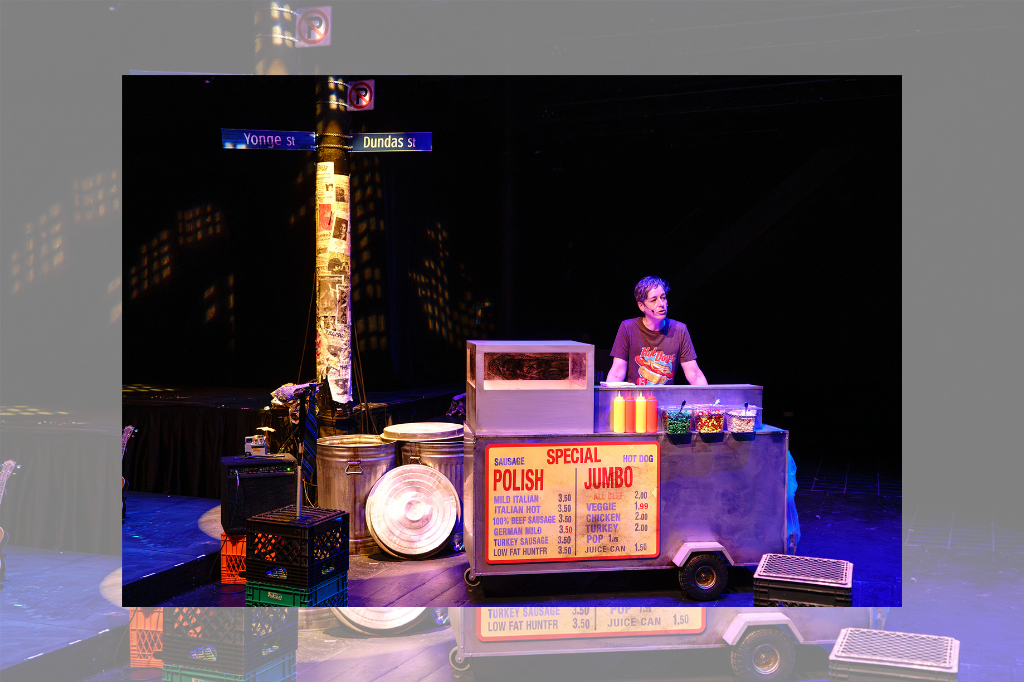REVIEW: No One’s Special at the Hot Dog Cart is a heartfelt slice of autobiography
If you’ve ever passed through Yonge-Dundas Square as the August sun blazes down – heating to scalding heights the concrete upon which lunching lawyers trample, preachers into megaphones inaudibly shout, and high schoolers from the Eaton Centre lumber – you’ll understand where actor-playwright Charlie Petch is coming from with their new solo show No One’s Special at the Hot Dog Cart, produced by Theatre Passe Muraille (TPM) in collabaration with Erroneous Productions.
Petch, who uses they/he pronouns, worked opposite that clamorous, soon-to-be-renamed stomping ground as a teenage hotdog vendor in the 1990s. His 65-minute show details the lessons slinging relish and toasting buns taught him about Toronto and its inhabitants. Although Autumn Smith’s production at the TPM mainspace is on the static side, Hot Dog Cart remains a heartfelt slice of autobiography, embroidered with care.
Monologuing to the audience, Petch, called Charlie in the script, sets the scene, explaining how Yonge-Dundas was different in the ’90s – no flashing walls of light, for one – before describing Frank, a recurring figure in the story. Frank, who harbours deep sadness over losing custody of his daughter, steals videotapes from nearby stores for a living. Charlie listens to his constant venting with compassion, calming the man.
Looking back, Charlie realizes that with Frank he was “practising the first steps in de-escalation technique.” He’d develop his conflict resolution skills further at Church and Gerrard, his next intersection, where he got to know the queer community (Petch himself is trans), before working a series of jobs requiring he thrive in emergencies: 911 operator, emergency room clerk, hospital bed allocator, and so on. They’re now a certified instructor in non-violent crisis intervention. (But no stranger to the arts: their bio labels them “a poet, playwright, librettist, musician, lighting designer, and host.”)
As he details his experiences working these positions, Charlie is careful to share mistakes made – moments in which he failed to “manage [his] response” to a situation. He tells of “yelling at an overworked nurse” and “making a man feel as if his vomited blood was nothing.” Charlie has learned from these bumps in the road; by including them, he lets us in on that valuable knowledge.
Joel Richardson’s set fills Theatre Passe Muraille with ’90s ephemera. A dilapidated NOW Magazine newsrack sits to the left of two telephone poles covered in black-and-white posters advertising cultural events. Centre-stage, milk crates and steel garbage cans flank a full-sized hotdog cart on wheels, complete with retro prices (an all-beef dog is a toonie, the sign tells us, though sadly none are cooked up during the show).
These references to an older Toronto buoy the first half of the play, which focuses on Charlie’s hotdog vendor experience. Once they begin discussing their later jobs, the set stops doing much. There’s figurative significance – working in the ER has similarities to working as a hotdog vendor, the show purports, so it makes a degree of sense that Charlie stays tucked behind his stand – but little reason for Charlie to interact with the ’90s playing space now that the show’s timeline has progressed. They, and it, remain more or less stuck in place.
As a memoir, Petch’s play has significant power, and the writing – laced with occasional jaunts into poetry – often resonates. But its joys are literary; he and Smith have not yet entirely worked out how to translate this story into stage action. An exception is a theatrical device involving a loop machine. A few times, Charlie picks up a couple instruments and uses the gadget to record beats, which serve as background music for the next few minutes of monologue. The spirit of this choice, requiring Petch to juggle instruments as a vendor might hotdogs, is lovely – but on opening night, the grooves didn’t always click, with the loop machine emphasizing musical errors by repeating them.
While Petch is in an excellent position to tell their own story, the play’s status as a solo show occasionally muddies its attempts to put forth an argument about crisis response. It’s tough to explore the importance of active listening when there’s only a single person onstage – Charlie can talk about it, but never embody it. Same goes for the audience: though we’re encouraged to actively listen, all we can do is listen closer to Charlie instructing us to listen, creating an infinite feedback loop. Hot Dog Cart flourishes whenever Petch accepts that the show is ultimately about him – he’s lived a mighty interesting life, and there’s real pleasure in hearing it detailed.
No One’s Special at the Hot Dog Cart runs at Theatre Passe Muraille until March 23. Tickets are available here.
Intermission reviews are independent and unrelated to Intermission‘s partnered content. Learn more about Intermission‘s partnership model here.














Comments